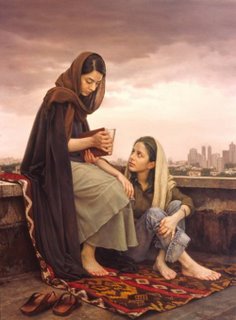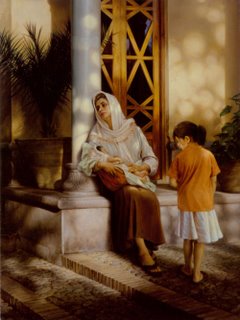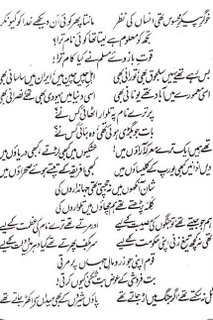Sunday, December 24, 2006
Indian army's biggest enemy - stress
Nobody quite knows why Lt Col Jha pulled the trigger on himself - he had been serving in the military for the past 14 years. According to his mother, Lalita Jha, "there was no tension, no problems. I just can't understand why he did it".
He is far from the only soldier to take his own life this year - Capt Sunit Kohli, Maj Sobha Rani, Lt Sushmita Chatterjee... the list goes on.
In fact, the Indian army is losing more soldiers in these incidents than in action against the enemy.
The army has lost 72 soldiers to enemy attacks so far this year. But over 100 soldiers have already taken their lives. In addition, another 32 have been killed by their colleagues.
What is happening to the army?
DISTURBING TREND
Since 2004, 282 soldiers have been killed in militant attacks
Since 2004, 408 soldiers have taken their lives, killed colleagues or died after colleagues ran amok
Of the 408 soldiers, 333 killed themselves
The million-strong force is clearly under tremendous stress.
Though it has not fought a full-blown war in decades, the force is bogged down in fighting domestic insurgencies, guarding restive borders and sometimes quelling civilian rioting.
Most experts attribute the growing stress to low morale, bad service conditions, lack of adequate home leave, unattractive pay and a communication gap with superiors.
Retired Maj Gen Afsar Karim, who has fought three wars, says that the stress may be high among soldiers because of lack of leave.
Indian soldier in Kashmir
The army is involved in quelling several local insurgencies
"The army is involved in a [difficult] long running internal security environment. There is lack of rest and they get very little leave. Lack of leave increases his stress," he says.
"Soldiers get angry when they are denied leave and their officers themselves take time off. It triggers a reaction, they are well armed and they take their own lives.''
Then there is the question of what many say is low pay - starting salaries in many jobs in middle-class India are double that of a new soldier, and for many of them the army no longer holds out the promise of a good life.
Retired Maj Gen Karim suspects that with the increase in numbers of soldiers, cohesiveness is being eroded.
"In our times, we used to know the names of our soldiers, where they came from. We used to meet their families, but now the army has expanded manifold and this cohesiveness is gone," he says.
Frayed nerves
The army says it is worried about this disconcerting trend.
Spokesman Col SK Sakhuja says soldiers kill each other when one of them perceives that they are being harassed by superiors or when they have heated arguments among themselves.
''We have strengthened formal and informal interaction between soldiers and officers. Leave policy, especially for soldiers posted in difficult areas, has been liberalised so that a soldier can go home to sort out his domestic problems," he says.
"Also, counselling by officers, psychiatrics and religious teachers is being undertaken.''
Delhi-based psychiatrist Achal Bhagat says a combination of stress and high alcohol consumption could lead to frayed nerves.
Yoga classes for soldiers in Kashmir
The army says it is holding classes to relieve stress
"What is needed is confidential counselling, creating a support system for the soldiers working in adverse conditions," he says.
The army is confident that this is a "testing time" for the force and it will pass.
"Our foundations are strong," says Col Sakhuja.
The problem is that there is not enough clarity still on what precisely is causing these soldier deaths.
Lalita Jha, mother of Pankaj Jha, hopes that she will find out more about her son's suicide.
"I am sure the army will look into the matter and find out what happened," she says.
Before more soldiers take their lives, one hopes.
Friday, December 22, 2006
Monday, December 11, 2006
Islam's Golden Age
Rabbi Shmuel HaNagid, the great Jewish poet and warrior, was appointed
the prime minister of Muslim Spain by the caliph of Cordoba (himself a
successor of General Tariq bin Ziyad). That was 935 years ago. Can the
president of the Islamic Republic of Pakistan dare send a non-Muslim to
the prime minister's office?
Sultan Saladin, the twelfth century century Muslim warrior, appointed
Rabbi Moses Maimonides, the great Jewish philosopher and surgeon, as his
personal physician. Sultan Saladin went on to rule Egypt, Syria, Yemen
and Iraq.
The four secrets to Islam's Golden Age were tolerance, merit, talent
and freedom to dissent. Based on merit, a Jew was appointed the prime
minister (religious beliefs of a citizen did not matter, talent did).
Other faiths were respected and citizens had the freedom to dissent.
Consider Abd al-Rahman III, caliph of Cordoba. Abd al-Rahman was in
love with books. Muslim Cordoba had 70 libraries. Just how many libraries
have been built by General Mohammed Yahya Khan, General Mohammed
Zia-ul-Haq, Ghulam Ishaq Khan, Benazir Bhutto, Mian Nawaz Sharif, Farooq
Ahmed Khan Leghari and General Pervez Musharraf all put together? Abd
al-Rahman's library had 44 volumes in the catalogue for the 400,000 volumes.
A thousand years hence and the National Library of Pakistan has a mere
130,000 books.
A rabbi was made the prime minister a thousand years ago and now we
disown Abdus Salam the only Noble Laureate this county ever produced (Dr
Salam was buried in Rabwah without any official protocol). No wonder the
caliph of Cordoba ruled over Spain, Portugal, Morocco, Algeria, Tunisia
and Libya while we are left with half of what we started out with.
Imagine, some 1200 years ago Jews of Cordoba, Malaga, Granada, Seville
and Toledo had welcomed Muslim conquerors (because they were being
persecuted by the Christians). When Muslims conquered Cordoba, Malaga,
Granada, Seville and Toledo they appointed Jewish administrators. Anyone
who had talent; Jews were appointed top diplomats, royal physicians,
viziers and statesmen. Christian scholars were called in as the caliph's
translators.
Ummayad al-Hakam II, another caliph of Cordoba and another book lover,
first made peace with Christian kingdoms around him and then attracted
scholars -- Muslims, Christians and Jews -- from Asia as well as from
Africa to come to Cordoba and translate books from Latin and Greek into
Arabic (Muslim Saudi Arabia has translated fewer books in the past 50
years than does Spain in a year).
Islam's Golden Age thrived on respect of other faiths, appointments on
merit and love of books. When we respected other religions and loved
books we ruled over North Africa, Nimes (France), Sicily (Italy),
Walachia (Romania), Cypress, Sardinia, Serbia, Bosnia and Herzegovina,
Albania, Venice, Hungary, Algeria, Egypt, Libya, Morocco, Sudan, Tunisia,
Mauritania, Mali, Niger, Chad, Ethiopia, Eritrea, Djibouti, Iran and all
the way to Pakistan.
We no longer respect other religions and hate books (there are 800
million illiterate Muslim men and women in 57 Muslim-majority OIC member
states). As a consequence, Muslims are 22 per cent of humanity but
produce less than five per cent of global GDP.
Arabs now respect other religions the least and hate books the most. No
wonder Arabs are particularly worse off. Take Saudi Arabia: The country
has still not adopted UN Universal Declaration of Human Rights; Women
are considered 'minors in perpetuity'; No other religion but Islam can
be publicly observed; Shias cannot be represented in Saudi courts.
Furthermore, only one per cent of the Arab population has a personal
computer, and only half of one per cent use the Internet. According to
United Nations' Arab Development Report: "Half of Arab women cannot read;
One in five Arabs lives on less than $2 per day; Fifteen per cent of
the Arab workforce is unemployed, and this number could double by 2010;
The average growth rate of per capita income during the preceding 20
years in the Arab world was only one-half of one per cent per annum, worse
than anywhere but sub-Saharan Africa."
A thousand years ago, we were literate, tolerated other religions and
were strong and prosperous. Now we are illiterate, weak and poor.
The writer is an Islamabad-based freelance columnist. Email:
farrukh15@hotmail.com
Dayaar-e-Gair Mein Kaise..........
Dayaar-e-Gair mein kaise tujhe sadaa detey
tuu mil bhii jaataa to tujhe ga.Nvaa detey
tumheen ne ham ko sunaayaa na apanaa dukh varana
duaa vo karate ke ham aasamaan hilaa detey
hamein ye zom rahaa ab ke vo pukaareingey
unhein ye zid thii ke har baar ham sadaa detey
vo teraa Gam thaa ke taasiir mere lahajey kii
ke jis ko haal sunaate usey rulaa detey
tumhein bhulaanaa hii avval to dastaaras mein nahein
jo iKhtiyaar bhii hotaa to kyaa bhulaa detey
tumhaarii yaad ne koi javaab hii na diyaa
mere Khayaal ke ansoo rahe sadaa detey
samantoon ko mein taa-umr kosataa Syed
vo kuchh na kahate magar ho.nTh to hilaa detey
***************************************************
Wednesday, December 06, 2006
Electrical Engineering vs. Computer Science
One advisor, an engineer, answered first. "It is a toaster," he said. The king asked, "How would you design an embedded computer for it?" The engineer replied, "Using a four-bit microcontroller, I would write a simple program that reads the darkness knob and quantizes its position to one of 16 shades of darkness, from snow white to coal black. The program would use that darkness level as the index to a 16-element table of initial timer values. Then it would turn on the heating elements and start the timer with the initial value selected from the table. At the end of the time delay, it would turn off the heat and pop up the toast. Come back next week, and I'll show you a working prototype."
The second advisor, a computer scientist, immediately recognized the danger of such short-sighted thinking. He said, "Toasters don't just turn bread into toast, they are also used to warm frozen waffles. What you see before you is really a breakfast food cooker. As the subjects of your kingdom become more sophisticated, they will demand more capabilities. They will need a breakfast food cooker that can also cook sausage, fry bacon, and make scrambled eggs. A toaster that only makes toast will soon be obsolete. If we don't look to the future, we will have to completely redesign the toaster in just a few years."
"With this in mind, we can formulate a more intelligent solution to the problem. First, create a class of breakfast foods. Specialize this class into subclasses: grains, pork, and poultry. The specialization process should be repeated with grains divided into toast, muffins, pancakes, and waffles; pork divided into sausage, links, and bacon; and poultry divided into scrambled eggs, hard- boiled eggs, poached eggs, fried eggs, and various omelet classes."
"The ham and cheese omelet class is worth special attention because it must inherit characteristics from the pork, dairy, and poultry classes. Thus, we see that the problem cannot be properly solved without multiple inheritance. At run time, the program must create the proper object and send a message to the object that says, 'Cook yourself.' The semantics of this message depend, of course, on the kind of object, so they have a different meaning to a piece of toast than to scrambled eggs."
"Reviewing the process so far, we see that the analysis phase has revealed that the primary requirement is to cook any kind of breakfast food. In the design phase, we have discovered some derived requirements. Specifically, we need an object-oriented language with multiple inheritance. Of course, users don't want the eggs to get cold while the bacon is frying, so concurrent processing is required, too."
"We must not forget the user interface. The lever that lowers the food lacks versatility, and the darkness knob is confusing. Users won't buy the product unless it has a user-friendly, graphical interface. When the breakfast cooker is plugged in, users should see a cowboy boot on the screen. Users click on it, and the message 'Booting UNIX v.8.3' appears on the screen. (UNIX 8.3 should be out by the time the product gets to the market.) Users can pull down a menu and click on the foods they want to cook."
"Having made the wise decision of specifying the software first in the design phase, all that remains is to pick an adequate hardware platform for the implementation phase. An Intel 80386 with 8MB of memory, a 30MB hard disk, and a VGA monitor should be sufficient. If you select a multitasking, object oriented language that supports multiple inheritance and has a built-in GUI, writing the program will be a snap. (Imagine the difficulty we would have had if we had foolishly allowed a hardware-first design strategy to lock us into a four-bit microcontroller!)."
The king wisely had the computer scientist beheaded, and they all lived happily ever after.

























